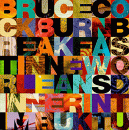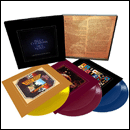
 [1] When You Give it Away (4:53)
[1] When You Give it Away (4:53) Musicians
When You Give It Away
Bruce Cockburn: Electric Guitars, Vocals, Handclaps
Gary Craig: Drums
Richard Bell: Organ
John Dymond: Bass
Rick Lazar: Percussion
Carlos Del Junco: Harmonica
Stephen Donald: Trombone
Sally Sweetland: Handclaps
Lucinda Williams: Harmony
Mango
Bruce Cockburn: Acoustic Guitar and Vocals
George Koller: Bass
Ben Riley: Drums
Daniel Janke: Kora
Margo Timmins: Harmonies
Last Night of the World
Bruce Cockburn: Acoustic Guitars, Vocals
Gary Craig: Drums
Richard Bell: Organ
John Dymond: Bass
Colin Linden: Electric Guitar
Janice Powers: Keyboard
Rick Lazar: Percussion
Jonell Mosser: Harmony
Isn’t That What Friends Are For
Bruce Cockburn: Acoustic Guitar, Vocals
George Koller: Bass
Rick Lazar: Percussion
Janice Powers: Keyboards
Ben Riley: Cymbals
Lucinda Williams: Harmony
Down to the Delta
Bruce Cockburn: Acoustic Guitar
George Koller: Bass
Rick Lazar: Percussion
Ben Riley: Drums
The Embers of Eden
Bruce Cockburn: Acoustic Guitar, Vocals
Steve Lucas:: Bass
Rick Lazar: Percussion
Janice Powers: Keyboards
Ben Riley: Drums
Jonell Mosser: Harmony
Blueberry Hill
Bruce Cockburn: Electric & 12-String Guitars, Vocals
Gary Craig: Drums
Richard Bell: Organ
John Dymond: Bass
Janice Powers: Keyboard
Margo Timmins: Duet Vocal
Let the Bad Air Out
Bruce Cockburn: Acoustic & Electric Guitars, Vocals
Steve Lucas: Bass
Rick Lazar: Percussion
Ben Riley: Drums
Carlos Del Junco: Harmonica
Stephen Donald: Trombone
Daniel Janke: Kora
Look How Far
Bruce Cockburn: Resonator & Electric Guitars, Vocals
Steve Lucas: Bass
Rick Lazar: Percussion
Ben Riley: Drums
Carlos Del Junco: Harmonica
Stephen Donald: Trombone
Janice Powers: Keyboard
Lucinda Williams: Harmony
Deep Lake
Bruce Cockburn: Acoustic Guitar
George Koller: Bass & Dilruba
Rick Lazar: Percussion
Use Me While You Can
Bruce Cockburn: Resonator & 12 String Guitars, Vocals
Gary Craig: Drums
Richard Bell: Organ
John Dymond: Bass
Daniel Janke: Kora
Lucinda Williams: Harmony
Editor's Note: This album was re-released in 2020 as part of the 50th Anniversay Box Set, re-mastered by Bruce's long-time producer Colin Linden, and is pressed on coloured vinyl.
2022: This album is being re-leased individually on 180 Gram Black Vinyl.
from - Peter North, The Edmonton Journal
- "The Rage of Bruce Cockburn", by Gerard Vos, Platenblad, translated into English by Arjan El Fassed, July, 1999.
Robyn Lewis: "The album is a far cry from the worlds of loss and desolation visited on albums past. The album is more personable than the material Cockburn is better-known-for-and it's more observational about emotional relationships than about the world at large.
BC: "It's harder to find the dramatic things in it... Each album had some sort of message-y stuff in it, and there is no end of issues worth paying attention to and writing about, but it would get boring for people if I only did that, too..."
RL: "Though the content of his most recent humanitarian efforts is not presented in the lyrics, it is certainly reflected in the musical stylings on the album.
BC: Toumani Diabete, who plays the kora, [a West African harp] and I play together in the film, and in the course of doing so, it fell together automatically, and that gave me the thought of having the kora on the album..."
"I'm always interested in the spiritual showing up in songs from one degree to another. This album is more cheerful and isn't focused on darkness."
- from "Rykodisc's Cockburn Serves Up 'Breakfast': Singer/Songwriter's 25th Set Takes A More Personal Perspective" by Robyn Lewis, Billboard, Vol.111, Issue 33, 14 August 1999. Anonymous submission.
"This album is more acoustic than most of the records I've done for awhile--though not for any particular reason other than that's what was around when I was writing the songs... Although I play a Linda Manzer live--because is has a pickup--I used a Collings in the studio and miked it with a Neumann U89 condenser."
[Cockburn describes his picking technique as] "a combination of Mississippi John Hurt and futile attempts at playing jazz when I was still in high school." [Although he loosely describes his style as "jazzy," he isn't a fan of jazz harmony.] "I've never been big on complicated chord structures," he says. "Early on, I started listening to Ravi Shankar and Arabic music, where they don't care about chords at all. I really related to the hypnotic quality of droning sounds, and the geometric shapes you can build by placing melodic movement on top of a droning bass part."
[...Nearly all the songs on Breakfast involve at least one string in non-standard tuning.] "If you're a fingerpicker," says Cockburn,"it makes sense to fool around with changing the bass note so you can play in different keys, and it's also a simple way to free up a lot of your left hand to play more complicated things."
- from "Bruce Cockburn: The Troubadour Effect", Guitar Player, September 1999, Vol. 33 Issue 9 p.35. Anonymous submission.
- from "Cockburn's healing songs: In career spanning 30 years, Canadian living legend offers 25th CD", by Robert Reid, Record Staff, 30 September 1999. Anonymous Submission.
Steve Lawson: The record sounds unfettered. Fun, passionate and full of energy.
BC: There wasn’t much restraint - the restraints on me are my technical ability
more than anything, and I suppose ones technical ability limits to some
degree what you can imagine, at least in my case it does! It doesn’t stop at
the same place, but you hear things projected from what you know how to do.
- from Bruce Cockburn Interview, Guitarist Magazine, November, 1999, by Steve Lawson.
BC: ...I did, in fact, during the time that these songs were being
written, have breakfast in New Orleans and dinner in Timbuktu; not on the
same day.
HANSEN: Is there a connection?
BC: There's not what I would call a connection exactly. There is a
kind of cultural line from the part of Africa where Timbuktu is to the part
of the Southern US where New Orleans is, but the connection is through the
blues really and through the history of that music. I did--sat in with Ali
Farka in a show that he was doing in Timbuktu and when we met, he said,
'Welcome to the birthplace of the blues.'
Mr. ALI FARKA: (Foreign language spoken)
BC: And I was a little skeptical of that because I've heard his
music and it sounds blues-influenced to me, or did, and he was dressed just
like John Lee Hooker, wearing a purple suit and a purple fedora, and I am
thinking, 'OK. I'll take this with a grain of salt.' But when I got to hear
the traditional music that came from around there that was played by people
who were very conspicuously not Western influenced, or European influenced,
the music sounded so much like the field hollers and so on that I used to
listen to on Folkways Records, the early Lomax recordings, that the
connection was inescapable. And I have to think that Ali Farka Toure is
absolutely right.
HANSEN: And that's where you were introduced to some of the musicians there
when you were working on the documentary.
BC: That's right. It was part of the filming process. Ali Farka
Toure, who may be familiar to a lot of listeners, who is from very near
Timbuktu, turned up while I was there, and I sat in with Ali Farka on a show
that he was doing in Timbuktu, and I had a fantastic chance to play with a
kora player named Tumani Diabete. Kora is the traditional harp, the
classical harp of West Africa. It's a 21-string thing with a grid resonator,
and it's capable of wonderful sounds, and it lends itself really beautifully
to being accompanied by a finger-picking guitar.
HANSEN: Mm. There's the kora player and you're playing your guitar up
against it so you have that beautiful blend.
BC: The kora player is a man named Daniel Janke. He's Canadian
and he studied in West Africa and he's familiar with a number of different
styles on the instrument. And I just--after playing with Tumani in Mali, I
thought that the instrument had to be on this album and particularly in that
song because of the debt that we're owed to the Malian landscape. It just
seemed like one that the kora should be in and Daniel did a great job of
putting that in it.
(Soundbite of Bruce Cockburn song)
BC: (Singing) Earl held in black fingers, the moon behind dry
trees. Earl held in black fingers, bird inside the rib cage just beating to
be free. Use me while you can. I've had breakfast in New Orleans, dinner in
Timbuktu...
- from "Bruce Cockburn, Musician, Shares History and Songs of his New CD, Breakfast in New Orleans, Dinner in Timbuktu" by Liane Hansen, Weekend Edition Sunday, National Public Radio, February 6, 2000. Submitted by Suzanne Capobianco.
Brent Bambury: We start off in New Orleans and end up in West Africa. Along the way
you drop off on Blueberry Hill.
BC: That's a New Orleans thing. The album isn't really about travel
particularly. At the time these songs were written, I did have breakfast in
New Orleans and dinner in Timbuktu. The songs fit on some kind of cultural
line that can be extended between the two places. So it seemed to work. And
Blueberry Hill plays into the New Orleans side of that balance.
Brent Bambury: Your version is louder than Fats Domino.
BC: And slower and whiter. It would be foolish to reproduce that
definitive version of the song. There's no way you can play it and do it
better than Fats or even as well.
-- from "Bruce Cockburn on international cuisine", CBC Infoculture, February 7, 2000, by Brent Bambury.
- from "Sun Shines on Cockburn's Breakfast", Vancouver Courier, February 9, 2000, by Jennifer Van Evra. Submitted by Audrey Pearson.
- from "The Good Fight, Politics, religion and music are a fine mix for Bruce Cockburn", Vancouver Sun, February 10-17, 2000. Submitted by Audrey Pearson.
- from "Worldly And Wise: Itinerant Troubadour Bruce Cockburn Maps The Human Experience", by Dave Irwin, Tucson Weekly, circa 22 February 2000. Submitted by Nigel Parry.